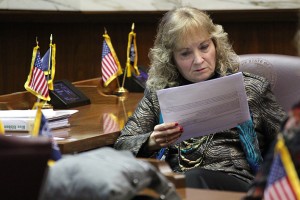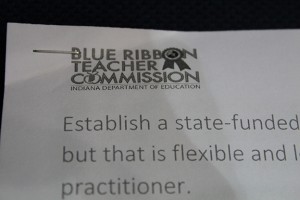Blue Ribbon Commission Finalizes Its Agenda For Teachers In 2016

State Superintendent Glenda Ritz reads through a report drafted by her colleagues on the 2015 Blue Ribbon Commission. (Photo Credit: Rachel Morello/StateImpact Indiana)
More concrete and specific designs for reversing Indiana’s teacher shortage are emerging ahead of the legislative session.
State Superintendent Glenda Ritz convened her Blue Ribbon Commission earlier this fall, following evidence of dwindling numbers of people entering the teaching profession throughout Indiana. After five meetings, the group whittled down a list of specific ideas Monday for improving Indiana’s teacher recruitment and retention rates.
The draft of the group’s report includes eight recommendations:
- Mentoring: Establish a state-funded, ongoing investment in a mentoring system, based on a common set of expectations, but that is flexible and locally designed, to support new teacher induction and nurture the reflective practitioner.
- Positive press: Create, implement, and sustain a robust marketing campaign that leverages all forms of media to promote the education profession.
- Compensation: Allow for locally-developed compensation models that include a pay scale which has a professional competitive base and index, regular increases, expands opportunities for pay based on career paths, including ongoing learning through advanced education; and establish and compensate teacher leadership and career ladders that have mentoring opportunities and ongoing advancement, support, and recognition of teacher skills and expertise.
- Teacher evaluations: Include in the local evaluation system an emphasis on how teachers use data from multiple forms of assessment, including informal, teacher-constructed, and standardized assessments to inform instruction and measure student growth, thus clarifying the purpose of and reducing the number of standardized tests.
- Diversity: Recruit and retain a diverse teacher workforce and candidate pool that includes underrepresented populations.
- Clinical experience: Strengthen partnerships among P[re-kindergarten)-12 schools and institutions of higher education and require significant, extended pre-service clinical experiences prior to licensing.
- Professional development: Identify and fund job-embedded professional development that improves teachers’ and administrators’ knowledge and practice.
- Career pathways: Re-envision teacher career pathways and leadership opportunities to encourage, develop, and retain teacher-leaders and provide pathways for promotion, so that teachers have the opportunity to advance in ways beyond leaving the classroom for administrative positions.
Within their list of recommendations, the group also includes specific actions that can be taken to improve conditions for teachers during periods of recruitment, pre-service, induction and throughout the course of their careers.
Once Commission members review their final report, it will be presented to legislators.
Superintendent Ritz says she’s not surprised to see that teacher evaluation and compensation were areas attracting the most conversation and debate over the course of the group’s time together. She adds that it was important to include leaders from different ends of the education world in on the conversation.
“It’s really those that are in the profession having a say about their profession,” Ritz says. “It was really a very good conversation over several long meetings. I think teachers throughout the state of Indiana will be glad to see this report and know that it came from the professionals.”
The presence of state legislators on the Commission became critical at Monday’s final meeting.
Rep. Randy Truitt, R-West Lafayette, spoke up to provide suggestions that would make the recommendation language easily understood by and WHAT for his colleagues in the General Assembly – for example, prodding the group to pinpoint specific dollar amounts for financial recommendations such as stipends.
Legislative leaders have said they will make teachers a priority during the 2016 session, which begins in January.
House Speaker Brian Bosma has indicated that the General Assembly will focus on methods for improving teacher recruitment – including the introduction of a new scholarship incentive – as well as ways to decouple teacher evaluations from ISTEP+ scores for one year.
This follows a call from Gov. Mike Pence, who has also said he would like to see lawmakers find a way to safeguard teachers and students from last year’s test. Scores are expected to be much lower than in the past, since 2015 marked the first year Indiana tested a new set of academic standards after dropping the Common Core.

